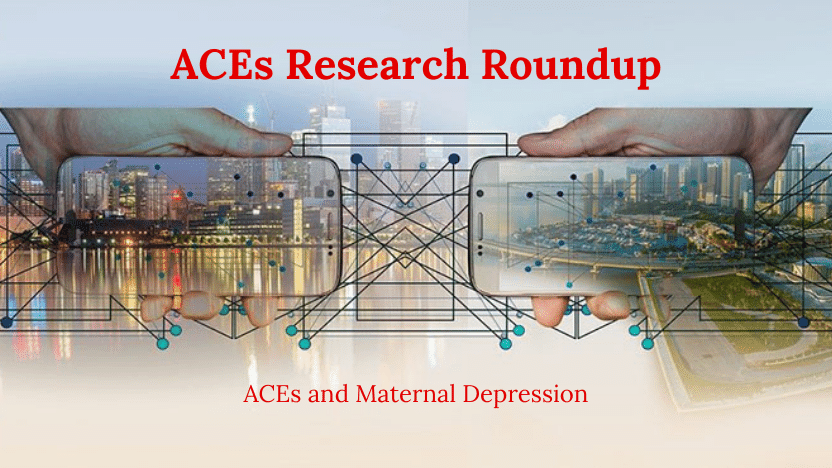Research Roundup: November 2020
Our monthly column highlights recent studies of Adverse Childhood Experiences (ACEs): causes, consequences, and the interventions that work.
Welcome to Stop Abuse Campaign’s inaugural Research Roundup! Each month, we will be publishing a short review of recently published papers that better our understanding of Adverse Childhood Experiences (ACEs). We cover scientific articles about the contexts in which ACEs are more (and less) likely to occur, how ACEs are related to health and well-being, and how we might intervene to prevent ACEs or reduce their negative impacts.
ACEs and social support linked to maternal depression in three recent studies
Maternal depression is an important outcome when thinking about how trauma and adversity are transmitted from one generation to the next. Maternal depression is linked to poor outcomes for both mother and child, 1 , 2 , 3 and mothers who have experienced adversity in childhood may be at higher risk of depression. 4 Three recent studies have expanded on this work, all finding that women who experience more Adverse Childhood Experiences are more likely to experience depression during pregnancy and/or after childbirth. The three studies showed consistent results despite having differing sample compositions: the Wajid and Racine studies were conducted in highly educated, relatively wealthy samples, while the Nidey study was conducted in a sample of younger, lower-income women.
In a Western Canadian sample of 636 pregnant women, Wajid and colleagues found that women with an ACE score greater than or equal to 4 had 2.5 times the odds of experiencing prenatal depression.5 Racine’s study of 1994 women in a prospective cohort study in Edmonton, Canada, revealed that higher ACE score was associated with greater odds of depressive symptoms during pregnancy (adjusted odds ratio (AOR) = 1.26 per 1-point increase in ACE score), during the postpartum period (AOR 1.34) and 2) across the perinatal period (AOR 1.31 per 1-point increase in ACE score).6 Finally, Nidey’s study of 419 women participating in a home visitation program in the greater Cincinnati area and Northern Kentucky found that women who were classified into groups 1) with high ACE scores 2) having experienced childhood maltreatment, or 3) having experienced childhood household dysfunction all scored significantly higher on postpartum depressive symptoms compared to women classified as having low ACE scores.
All three studies also examined social support during and after pregnancy, given previous evidence that social support might serve as a protective factor against maternal depression.7 All studies found that lack of social support was strongly associated with maternal depression; in fact, the size of the association was even larger than the association between ACEs and maternal depression. However, findings on the relationship between ACEs, social support, and depression were mixed. In Nidey’s study of women participating in-home visitation programs, the authors found that higher ACE scores resulted in fewer social ties and poorer social support, which in turn increased the likelihood of maternal depression. However, although Racine and Wajid found associations between social support and maternal depression, they did not find differences in the relationship between ACEs and maternal depression between those with and without strong social support.
These studies indicate that Adverse Childhood Experiences are an important risk factor for maternal depression. Social support may be one effective mechanism to improve outcomes, and further research will likely continue to explore the relationship between ACEs, social support, and maternal mental health.
Telomere length and epigenetic modifications may link ACEs to adverse health outcomes
While ACEs have been linked to a wide range of negative health outcomes,4 the precise biological mechanisms involved in these processes is not fully understood. Recently, measures of accelerated aging, such as telomere length and epigenetic modification, have been proposed as potential explanations. Telomeres and epigenetic modifications both have to do with DNA- the genetic material in cells. Telomeres are “caps” on the end of DNA that protect chromosomes from damage. As cells divide, telomeres shorten, and after several divisions, the telomeres become too short for the chromosome to replicate and cell death follows. Telomere shortening has been linked to a range of negative outcomes including depression,8 heart disease,9 cancer.10 Previous research suggests that stress may shorten telomere length.11 ,12 Second, epigenetic modifications are changes in gene expression that can occur without changing the underlying DNA. They are thought to regulate functions in the body and respond to changes in the environment, and may also be affected by stress.13
Two recent studies examine these biological pathways in greater detail. The first, a systematic review of the relationship between ACEs and epigenetic modifications/telomere length by Lang and colleagues,14 finds evidence that ACEs are associated with epigenetic modifications of certain markers, when measured in adulthood. There was also some evidence suggesting that ACEs are associated with shorter telomere length in adulthood, if physical neglect was involved. The second article is a prospective study of 155 mother-infant dyads.15 Esteves and colleagues assessed potential intergenerational impacts of ACEs by examining the relationship between maternal ACEs and offspring telomere length. Higher maternal ACE scores are associated with shorter infant telomere length at several time points, and were also associated with more internalizing and externalizing behaviors. These relationships were still present after accounting for maternal postnatal depression and prenatal stress.
These findings point to measures of accelerated aging, such as telomere length and epigenetic modifications, as potential mechanisms linking ACEs with poor health outcomes. However, clear interpretations of this association are not yet possible given documented concerns about the telomere length measure,16 and more robust studies are needed at various time points in childhood, adulthood, and later life.14 However, it remains an area of considerable research interest, and future studies will provide greater insight into whether these measures might explain how ACEs translate to poor health outcomes years and decades after they occur.
Works Cited
1 Glover, V. (2014). Maternal depression, anxiety and stress during pregnancy and child outcome; what needs to be done. Best practice & research Clinical obstetrics & gynaecology, 28(1), 25-35.
2 Madigan, S., Oatley, H., Racine, N., Fearon, R. P., Schumacher, L., Akbari, E., … & Tarabulsy, G. M. (2018). A meta-analysis of maternal prenatal depression and anxiety on child socioemotional development. Journal of the American Academy of Child & Adolescent Psychiatry, 57(9), 645-657.
3 Tarabulsy, G. M., Pearson, J., Vaillancourt-Morel, M. P., Bussières, E. L., Madigan, S., Lemelin, J. P., … & Royer, F. (2014). Meta-analytic findings of the relation between maternal prenatal stress and anxiety and child cognitive outcome. Journal of Developmental & Behavioral Pediatrics, 35(1), 38-43.
4 Felitti, V. J., Anda, R. F., Nordenberg, D., Williamson, D. F., Spitz, A. M., Edwards, V., & Marks, J. S. (1998). Relationship of childhood abuse and household dysfunction to many of the leading causes of death in adults: The Adverse Childhood Experiences (ACE) Study. American journal of preventive medicine, 14(4), 245-258.
5 Wajid, A., van Zanten, S. V., Mughal, M. K., Biringer, A., Austin, M. P., Vermeyden, L., & Kingston, D. (2020). Adversity in childhood and depression in pregnancy. Archives of women’s mental health, 23(2), 169-180.
6 Racine, N., Zumwalt, K., McDonald, S., Tough, S., & Madigan, S. (2020). Perinatal depression: the role of maternal adverse childhood experiences and social support. Journal of affective disorders, 263, 576-581.
7 Leahy‐Warren, P., McCarthy, G., & Corcoran, P. (2012). First‐time mothers: social support, maternal parental self‐efficacy and postnatal depression. Journal of clinical nursing, 21(3‐4), 388-397.
8 Ridout, K. K., Ridout, S. J., Price, L. H., Sen, S., & Tyrka, A. R. (2016). Depression and telomere length: A meta-analysis. Journal of affective disorders, 191, 237-247.
9 Brouilette, S., Singh, R. K., Thompson, J. R., Goodall, A. H., & Samani, N. J. (2003). White cell telomere length and risk of premature myocardial infarction. Arteriosclerosis, thrombosis, and vascular biology, 23(5), 842-846.
10 Wentzensen, I. M., Mirabello, L., Pfeiffer, R. M., & Savage, S. A. (2011). The association of telomere length and cancer: a meta-analysis. Cancer Epidemiology and Prevention Biomarkers, 20(6), 1238-1250.
11 Epel, E. S., Blackburn, E. H., Lin, J., Dhabhar, F. S., Adler, N. E., Morrow, J. D., & Cawthon, R. M. (2004). Accelerated telomere shortening in response to life stress. Proceedings of the National Academy of Sciences, 101(49), 17312-17315.
12 Starr, J. M., Shiels, P. G., Harris, S. E., Pattie, A., Pearce, M. S., Relton, C. L., & Deary, I. J. (2008). Oxidative stress, telomere length and biomarkers of physical aging in a cohort aged 79 years from the 1932 Scottish Mental Survey. Mechanisms of ageing and development, 129(12), 745-751.
13 Franco, R., Schoneveld, O., Georgakilas, A. G., & Panayiotidis, M. I. (2008). Oxidative stress, DNA methylation and carcinogenesis. Cancer letters, 266(1), 6-11.
14 Lang, J., McKie, J., Smith, H., McLaughlin, A., Gillberg, C., Shiels, P. G., & Minnis, H. (2019). Adverse childhood experiences, epigenetics and telomere length variation in childhood and beyond: a systematic review of the literature. European child & adolescent psychiatry, 1-10.
15 Esteves, K. C., Jones, C. W., Wade, M., Callerame, K., Smith, A. K., Theall, K. P., & Drury, S. S. (2020). Adverse childhood experiences: implications for offspring telomere length and psychopathology. American Journal of Psychiatry, 177(1), 47-57.
16 Shiels, P. G. (2010). Improving precision in investigating aging: why telomeres can cause problems.
Do you know your score?
Discover your ACE score and unlock a new understanding of your life. Take the test and gain insights into how your early experiences shape your well-being. Don't let your past define you – empower yourself with knowledge.

Gloria Hu
Doctoral Student, Epidemiology, Mailman School of Public Health
Gloria is an incoming doctoral student in epidemiology at the Mailman School of Public Health. Her recent research includes work with the Global Violence Against Children and Youth Surveys (VACS) and qualitative research involving HIV-positive, formerly incarcerated individuals and the reentry process. She has also previously volunteered at youth correctional facilities in upstate New York.
